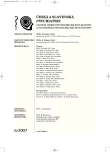-
Medical journals
- Career
Pharmacotherapy of Anorexia Nervosa
Authors: E. Češková; I. Palčíková
Authors‘ workplace: Psychiatrická klinika LF MU a FN Brno přednostka prof. MUDr. E. Češková, CSc.
Published in: Čes. a slov. Psychiat., 103, 2007, No. 6, pp. 280-284.
Category: Comprehensive Reports
Overview
The treatment of anorexia nervosa remains problematic. Pharmacotherapy is considered to be an additive treatment. Antidepressants are mostly used and atypical antipsychotics start being in the centre of interest. Antidepressants, usually selective serotonin reuptake inhibitors, are indicated in the maintenance treatment for relaps prevention and for controlling depressive, anxious and obsessive-compulsive symptoms, which can be prominent in some patients. The efficacy of antidepressants in the acute phase of illness with cachexia and malnutrition is minimal. A great deal of psychiatrists are ambivalent to the use of atypical antipsychotics. An individual approach and a careful evaluation of the risk/benefit ratio are recommended.
Key words:
anorexia nervosa, antidepressants, antipsychotics.
Labels
Addictology Paediatric psychiatry Psychiatry
Article was published inCzech and Slovak Psychiatry

2007 Issue 6-
All articles in this issue
- A Psychosocial Need Inquiry in Young Acute Psychotic Patients (A Pilot Study)
- Pharmacotherapy of Anorexia Nervosa
- Repetitive Transcranial Magnetic Stimulation (rTMS), Depressive Disorder and Cognitive Functions (A Review)
- Night Eating Syndrome
- Central Pontine Myelinolysis in Female Patient with Anorexia Nervosa
- Czech and Slovak Psychiatry
- Journal archive
- Current issue
- Online only
- About the journal
Most read in this issue- Central Pontine Myelinolysis in Female Patient with Anorexia Nervosa
- Repetitive Transcranial Magnetic Stimulation (rTMS), Depressive Disorder and Cognitive Functions (A Review)
- Night Eating Syndrome
- Pharmacotherapy of Anorexia Nervosa
Login#ADS_BOTTOM_SCRIPTS#Forgotten passwordEnter the email address that you registered with. We will send you instructions on how to set a new password.
- Career

